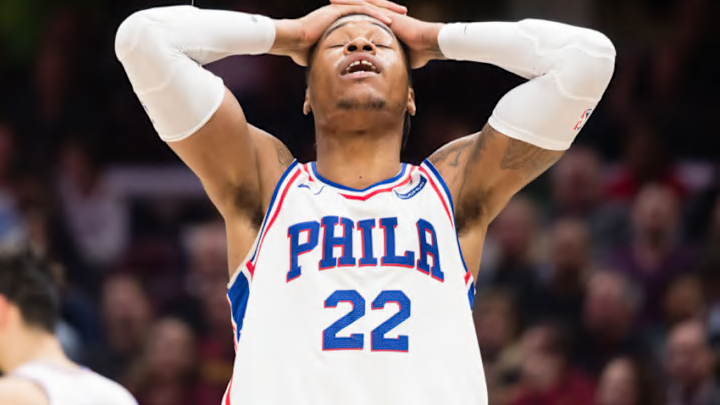At this point, there’s no reason for the Philadelphia 76ers to keep Richaun Holmes on the bench.
Thursday night’s loss in Portland was upsetting for a number of different reasons. The officiating was bad, turnovers were prevalent (again) and the Philadelphia 76ers saw their offense stall down the stretch for what seems like the 1000th time this season.
They’re a young team, but the Sixers are still painfully bad at retaining leads. This is the third time in nine games that they’ve blown an 16-plus point lead. For a team looking to crack the playoffs, that just can’t happen.
It was more than just the late-game collapse that left some question marks last night, though. Brett Brown continued to use some questionable rotations, opting to keep Richaun Holmes glued to the bench all game while letting Amir Johnson and Trevor Booker carry the backup center load.
More from Sixers News
- 3 Sixers players who could help Team USA Basketball
- 76ers 2k24 ratings: 3 most underrated players on Philadelphia roster
- 76ers head coach Nick Nurse bares lofty plans for Paul Reed this season
- Grade the Trade: 76ers swap Tobias Harris for superstar PG in mock deal
- Breaking Down Bombshell Report on Sixers Star James Harden
Johnson wasn’t necessarily bad last night, either. He rebounded well, hit a couple hooks shots around the rim and even sent an opposing shot into the first row, which I didn’t know he was physically capable of doing anymore. Booker did his typical things as well, banging underneath and finding some good positioning around the lane offensively.
But even with those two playing well, there’s no reason to keep Holmes on the bench. He’s better, he’s younger, and he’s a better fit alongside the personnel Brown has on the court. Unless we’re basing rotations on contract amounts, Holmes is the most deserving backup by a significant margin.
He doesn’t have the strongest frame, but Holmes makes up for that with ample mobility, elevation and toughness. He’s quick enough to stretch out to the perimeter defensively, while his athleticism allows him to get up and contest shots at the rim.
He also plays harder than just about everybody else on the floor, which is saying something on a team that includes T.J. McConnell, Dario Saric and Justin Anderson.
On sheer energy alone, Holmes has shown he can make an impact defensively while finding his way to rebounds. Offensively, he’s the only Sixers big who can play above the rim, making him uniquely valuable alongside Ben Simmons.
To add to that, he’s also the only remotely capable shooter between the three backup centers. Johnson and Booker have both shot at some point during their careers, but Johnson’s form has eroded while Booker hasn’t attempted a jumper since donning a Sixers uniform for the first time.
Whether it be in a two-big rotation alongside Embiid or just stepping in whenever Embiid sits, there’s no viable reason against putting Holmes in the game. He has his faults, but Johnson and Booker are far from reliable at this point.
Next: Comparing the 2018 and 2017 draft classes by position
Brett Brown is a great coach, and I’ll continue to stick by that assessment. This game came down to way more than not playing Holmes. But, in the end, that doesn’t excuse the fact that Holmes has been inactive for two straight games when he clearly deserves playing time.
